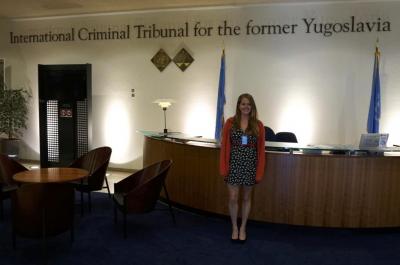Secondary menu
Limits to the Rights of the Accused at the ICTY
By Glenn Gibson, 3L (JD/MGA), International Criminal Tribunal for the former Yugslavia (The Hague)
 A cornerstone of a just and effective criminal proceeding is the protection of the rights of the accused. The uneven application of the law undermines due process and can compromise the legitimacy of the entire legal proceedings. Some of the first international criminal tribunals that charged individuals for war crimes included limited protections for those who stood accused of committing mass atrocities resulting in so-called “victors’ justice.”
A cornerstone of a just and effective criminal proceeding is the protection of the rights of the accused. The uneven application of the law undermines due process and can compromise the legitimacy of the entire legal proceedings. Some of the first international criminal tribunals that charged individuals for war crimes included limited protections for those who stood accused of committing mass atrocities resulting in so-called “victors’ justice.”
The International Criminal Tribunal for the former Yugoslavia (ICTY) has attempted to ensure an impartial and fair process that protects the rights of the accused through several important safeguards in the Tribunal’s statute, including the right to be tried expeditiously, without undue delay, with full respect for due process rights (as enumerated in other international treaties, such as the International Covenant on Civil and Political Rights), and the right to have “adequate time and facilities for the preparation of his defense.”
However, the law continues to evolve and new issues continue to arise. The scope of the rights of the accused was clarified in the Appeals Chamber’s denial of Slobodan Praljak’s request to represent himself and receive translations of the Trial Judgment and appellate proceedings in Croatian.
Slobodan Praljak held various positionsintheMinistryofDefence of Croatia and was commander of the HVO (Croatian Defence Council) Main Staff during the conflict in the former Yugoslavia. In May 2013, the Trial Chamber in Prlić et al. found him responsible for a variety of offences in Bosnia-Herzegovina including destruction of mosques, killings, illegal detention, and attacksonmembersofinternational organizations. He was sentenced to 20 years in prison and has since appealed.
On April 28, 2014, Praljak wrote a letter to the President of the Tribunal informing him of his decision to represent himself, and requesting translations of the Trial Judgment and all appellate submissions and correspondence in Croatian. He also requested a stay of proceedings until he received all of the requested translations.
Almost two months later, the Appeals Chamber denied his request, grounding their analysis in the interests of justice. In the decision, the Appeals Chamber made several interesting points related to the scope of Praljak’s rights. The Chamber recognized that the Statute creates an obligation to provide relevant material in a language which the accused can understand “sufficiently in order to allow for the effective exercise of his right to conduct his defence.” On the other hand, the Chamber noted several significant practical concerns related to the translation of these documents. The Registry confirmed that the translations would take, at minimum, several years to complete.
The Chamber also emphasized the complexity of the case, and raised concerns about the ability of Praljak to effectively represent himself. The case involves six accused individuals, and raises complex legal and factual issues relating to crimes committed in a total of eight municipalities and a network of detention facilities across the territory of Bosnia and Herzegovina, over a period of more than two years. The Chamber determined that because Praljak does not have any previous legal training (unlike other accused people who have represented themselves at the Tribunal in the past) he would not be capable of effectively managing his appeal in an adequate and timely manner.
Finally, the Chamber noted that granting this request would in fact negatively affect the rights of the co- accused. The Chamber emphasized the importance of ensuring adequate legal representation in the context of a multi-accused case. Thus, they reasoned that the delays caused by Praljak’s request would undermine the rights of the co-accused to fair and expeditious proceedings.
This decision by the Appeals Chamber highlights the challenges inherent in international criminal proceedings, where judges must balance the rights of the accused with broader considerations of justice and the context of the tribunal. At first glance it is surprising that the protection of the rights of the accused can be reconciled with an order denying a request for self- representation. However, the reasoning behind the Chamber’s decision suggests that they considered Praljak’s rights to be better protected by ensuring that he has appropriate representation. Although more can be done to safeguard the rights of the accused, this decision indicates that the Chamber is firmly committed to maintaining due process and a fair trial, thus ensuring the Tribunal’s legitimacy and ability to contribute to the broader peace building process.
Photo: Glenn Gibson in the lobby of the International Criminal Tribunal for Yugoslavia in The Hague during the trial of General Ratko Mladic (credit: Ullic Egan, ICTY Appeals Intern)
